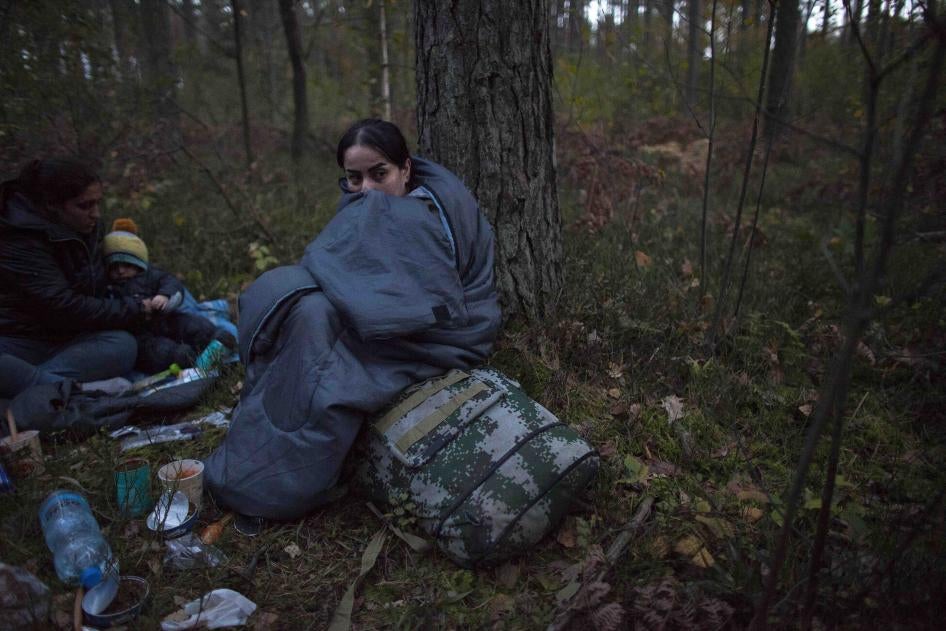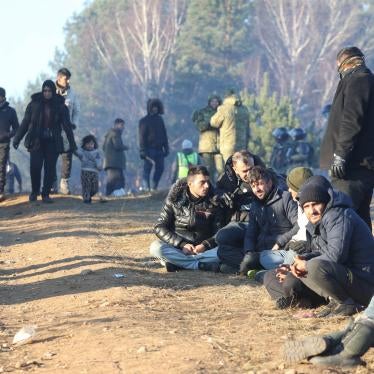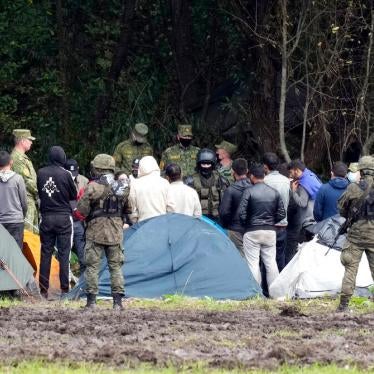(Brussels) – The crisis at the Belarus-Poland border is leading to serious human rights violations against migrants and asylum seekers by both governments, Human Rights Watch said in a report released today.
The 26-page report, “‘Die Here or Go to Poland’: Belarus’ and Poland’s Shared Responsibility for Border Abuses,” documents serious abuses on both sides of the border. People trapped on the Belarus border with Poland said that they had been pushed back, sometimes violently, by Polish border guards to Belarus despite pleading for asylum. On the Belarusian side, accounts of violence, inhuman and degrading treatment and coercion by Belarusian border guards were commonplace.
“While Belarus manufactured this situation without regard for the human consequences, Poland shares responsibility for the acute suffering in the border area,” said Lydia Gall, senior Europe and Central Asia researcher at Human Rights Watch. “Men, women, and children have been ping-ponged across the border for days or weeks in freezing weather, desperately needing humanitarian assistance that is being blocked on both sides.
Human Rights Watch went to both countries in October 2021 and conducted in-depth interviews with 19 people, including single men, families with children, and women traveling alone.
Trapped on the Belarusian side, stranded or lost on the Polish side, people told harrowing stories of trudging through forests, swamps, marshlands, and rivers in freezing temperatures for days and even weeks without food or water. Some said they were forced to drink swamp water or collect rain water in leaves to drink. At least 13 people have died as a result of inhumane conditions, including a 1-year-old Syrian boy.
A 35-year-old man from the Democratic Republic of Congo, traveling with his wife and 3 children, all under 7, said his family was pushed back twice by Polish border guards in October. During the second incident, he said he pleaded with the Polish guards for asylum but that they would not listen: “They said, ‘There’s no asylum, there’s nothing, go back to where you came from!’ They [took us by vans] and made us go back to Belarus, to the neutral zone.”
The mid-November standoff at the Bruzgi border crossing, where thousands of people were trapped, is the culimination of developments since last May following the state hijacking by Belarus of a Ryanair airplane to arrest a passenger. His arrest triggered European Union sanctions against Belarus, to which Belarus president Aleksandr Lukashenko responded by stating that he would open Belarus’ border to migrants by facilitating visas.
Since August, thousands of people, mainly from Syria, Iraq, and Yemen, have traveled to the capital Minsk in Belarus, through Middle East-based holiday tour operators making false claims of easy EU entry.
Three people told Human Rights Watch that Polish border guards separated their families, including parents from their children, when they took those in need of medical care to the hospital, but pushed the other family members back to Belarus. A Syrian woman whom the Polish border guards decided needed medical care was separated from her 5-year-old son in late October, who, together with other family members, was pushed back to Belarus. Still in Poland, she had had no contact with her family since being separated from them.
In response to a letter from Human Rights Watch, Polish authorities denied that they engaged in pushbacks, separating families, or refusing to consider asylum claims. However, citing a recent amendment to the law in Poland, they said border officials were authorized to immediately return people who crossed the border illegally and, as of November 16, 2021, border officials had prevented 29, 921 from crossing illegally this year.
Following Polish pushbacks, interviewees said, Belarusian border guards detained and abused them in “collection sites,” open spaces where migrants were gathered and trapped, without food, water, or shelter and prevented from going back to Minsk or their own countries. Belarusian authorities have not responded to a request from Human Rights Watch to comment on the findings
Until November 18, thousands of people on the Belarusian side were sleeping in a makeshift camp at Bruzgi, one of the major border crossings. Belarusian authorities have dismantled the camp and reportedly accommodated at least some of the people in a warehouse nearby, although the situation and whereabouts of those who had been in the makeshift camp is unknown.
Belarusian and Polish authorities have an obligation to prevent further deaths by ensuring regular humanitarian access to the people stuck in the border area, Human Rights Watch said. Both countries should also immediately halt ping-pong pushbacks and allow independent observers, including journalists and human rights workers, access to currently restricted border areas. In August and September, the European Court of Human Rights instructed Poland to provide food, water, clothing, adequate medical care, and if possible temporary shelter to persons on the border. The European Court does not have jurisdiction over Belarus.
Belarus’ abuse of people at its border amounts at least to inhuman or degrading treatment or punishment, and may in some cases constitute torture, in violation of Belarus’ international legal obligations. The authorities should immediately halt the abusive practices and hold those responsible for abuses to account.
Pushback practices by Polish border guards violate the right to asylum under EU law including the charter of fundamental rights, create a risk of chain refoulement contrary to international refugee law, and expose people to inhuman and degrading conditions, in violation of Polish and EU law.
European Commission has failed to speak publicly about Poland’s responsibility for the abuses and the human crisis at its border, or to clearly call on Poland to stop banning media and humanitarian groups from areas where abuses are taking place.
“The European Commission should start showing solidarity with the victims at the border on both sides who are suffering and dying,” Gall said. “Belarus may have orchestrated the crisis but that doesn’t absolve Poland and EU institutions of their human rights obligations. Brussels should push Warsaw to put preservation of human life at the core of its response.”









